This is a very article and includes short videos that I cannot download and add to the article Here the link to the article with video's so that you can fully explore this topic.
New studies show that energy drinks and junk food adversely affect the developing brain in numerous ways.
Life depends upon such a precarious balancing of forces that comprehending the totality of influences can be exhausting, yet getting lost in the minutia is equally crippling. The last few decades have produced an unforgivable amount of energy devoted to optimizing cognitive and physical performance through micro-nutrients and compounds deserving far less attention.
The successful growth of animals is dependent upon the totality of their environment. Our penchant for marketing and selling isolated molecules speaks more to our habit of indulging fantasies than good science. There is no such thing as a “superfood.” There is food, some of it healthy, much of it not.
However, we know certain things to be true. The detrimental effects of sugar cannot be understated, even as we’re saturated with information about the metabolic nightmare this carbohydrate wages. Then again, decades of literature on the deadly effects of tobacco hasn’t resulted in a cessation of smoking. Sugar is an even harder addiction to break, especially given its ubiquity, the invented names companies use to shield our prying eyes. And as I wrote about earlier this year, sugar is even the main culprit in our toxic love of cigarettes.
The 22.4 teaspoons of sugar the average American eats every single day is crippling at any age. New research published by the Teratology Society, in a journal focused on teenage brain development, Birth Defects Research: The Teenage Brain, finds sugar to be especially damaging for teenagers. The growing popularity of energy drinks and junk food in teens is adversely affecting latter stages of their brain development.
RMIT University’s Amy Reichelt writes that junk food negatively affects decision making and provokes reward-seeking behavior, which sets up the teen for a lifetime of poor dietary and behavioral habits. Two major neurotransmitter systems—dopamine-mediated reward signaling and inhibitory transmission—are both adversely affected by sugar-heavy junk foods during a critical phase of brain development.
Adolescence is a critical nexus when the last fundamental stages of brain development occur alongside a heightened period of behavioral alterations, thus creating a “perfect storm” where lifestyle choices can change the trajectory of brain development and exert long-term impacts on brain health.
Given how accessible cheap, energy-rich, nutrient-poor junk foods are to teenagers—teens consume the highest amounts of these foods of any age group—a lifetime of poor behavioral choices follow when no interventions are made. The stunning rise of obesity in not only adults but children and teens as well is cause for alarm. The prevalence of obesity in American children is now at 31 percent.
The changes in reward circuitry prompted by junk food result in poor cognitive and emotional performance. The teen (and future adult) suffers from increased impulsive behavior and impairments in memory consolidation and social interactions. Males in particular experience impaired behavior inhibition after consuming large volumes of sugar sweetened beverages. The hippocampus suffers in high-sugar diets, which is also known to induce cognitive deficits over time.
The overconsumption of junk foods during adolescence causes specific neurobiological changes to reward systems that impact the development of frontostriatal and frontotemporal neurocircuitry. This reduces the capacity for behavioral inhibition during adolescence, and leads to the pronounced behavioral alterations observed in cognitive tasks reliant on these systems.
The study on energy drinks, led by Christine Curran and Cecile Marczinsk at Northern Kentucky University, focuses on the deleterious effects of another form of junk food, heavy in caffeine and taurine. Alcohol is also implicated in this research, as energy drinks are especially popular mixers. This projected $60 billion global industry troubles the authors, given the insidious mixture of caffeine and taurine:
The data suggest that age is an important factor in both caffeine and taurine toxicity. Although the aged or diseased brain might benefit from taurine or caffeine supplementation, it appears that adolescents are not likely to benefit from supplementation and may, in fact, suffer ill effects from chronic ingestion of high doses.
Since energy drinks are sold as food supplements, companies are not required to list caffeine levels. While caffeine toxicity is not often discussed—45 percent of all reported cases occur in children or teens—Curran and Marczinsk note caffeine levels per energy drink range from a relatively safe 50 mg to a whopping 505 mg. One energy drink has the potential to push 70 percent of children and 40 percent of teens above adverse effect levels, considered to be 3 mg/kg/day.
Caffeine can increase blood pressure and heart rate; when combined with the amino acid taurine the likelihood that this happens increases. Using research on mice, the authors share the cognitive problems this combination presents. While they acknowledge that caffeine does indeed have positive cognitive effects in adults, they conclude:
The developing brain is uniquely sensitive to caffeine’s effects through early adulthood, and fatigue in a developing child is an indicator for the need to rest and not an indication for need for caffeine administration.
The main problems are in learning and memory retention in developing brains, similar to issues experienced due to an over consumption of junk foods. Addictive substances usually result in chronic impairment. We don’t recognize the problems when we’re in the middle of them. For teens hooked on sugar, caffeine, and taurine, adulthood is simply the seamless continuation of bad habits that have helped shape their very conception of who they are and how they function as animals.
Given that obesity is changing the DNA of future generations, until we give up our toxic love of these addictive substances it’s doubtful we’ll return to the highly functional, diverse bodies that helped us evolve over millions of years. Until we change our environment there’s little chance we’ll improve upon the cognitive and behavioral problems plaguing our society. Evolution is defined by a struggle for survival. Right now sugar is thriving, at our expense.
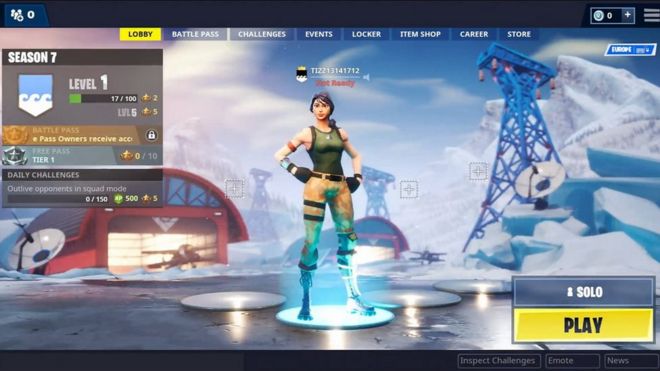
Children as young as 14 are making thousands of pounds a week as part of a global hacking network built around the popular video game Fortnite.
About 20 hackers told the BBC they were stealing the private gaming accounts of players and reselling them online.
Fortnite is free to play but is estimated to have made more than £1bn through the sale of "skins", which change the look of a character, and other add-ons.
This fuels a growing black market.
Hackers can sell player accounts for as little as 25p or hundreds of pounds, depending on what they contain.
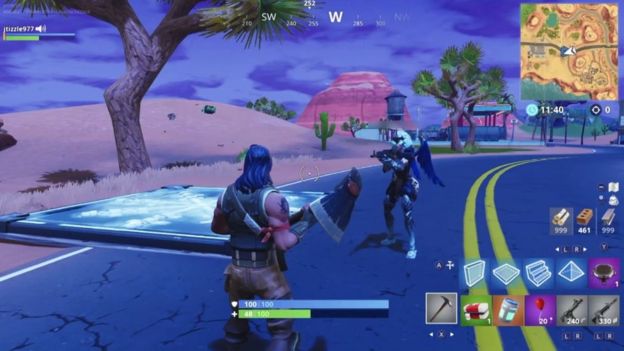
The items are collected as in-game purchases but are purely cosmetic and do not give gamers any extra abilities.
Fortnite-maker Epic declined to comment on the investigation but said it was working to improve account security.
The game has more than 200 million players.
'Felt horrible'
One British hacker said he got involved at the age of 14 earlier this summer, when he himself became the victim of a hack.
Speaking from his bedroom via a video chat, wearing a baseball cap and bandana to hide his identity, the teenager said he had spent about £50 of his pocket money to build up a collection of skins, when he had woken up to a message that changed everything.
"The email said that my password had been changed and two-factor authentication had been added by someone else. It felt horrible," he recalled.
Two-factor authentication meant his account could only be accessed by entering a code sent to an email address or app registered by the perpetrator.
Like many victims, he turned to Twitter to vent his frustration.
That was where he saw new accounts containing even better items on sale.
"I was approached by someone who said I could buy an account for 25p and I could clearly see the account was worth a lot more," he recalled.
"I bought it."
He knew he was playing on a stolen account but with so many others doing it online and making lots of money, he was soon drawn into the world of "Fortnite cracking".
"I was approached by a cracking team and they told me what it was and all about 'combos', 'proxies' and I guess they showed me how to crack," he said.
'Lucky dip'
He said they showed him where to find the vast lists of usernames and passwords published online from other data breaches over the years.
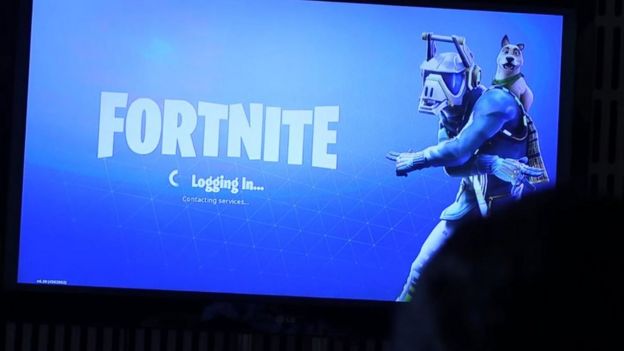
They showed him where to buy "off-the-shelf" hacker tools needed to input those credentials into the login page of Fortnite. Once inside an account, they showed him how to take it over and then sell it to the hungry online community.
He insisted that he only carried out one cracking session. But in that single day he managed to access more than 1,000 Fortnite accounts.
"It's lucky dip basically, you either get a good account or you don't. People like the rarity of the 'skins' and it's about the look of them and showing off to friends."
The hacker said he was now a middleman for other crackers, selling on accounts he knew to be stolen. In his first few weeks, he made around £1,500 and bought himself some games and a new bicycle.
He said he knew what he was doing was illegal, but his parents were aware of his activities and had not stopped him.
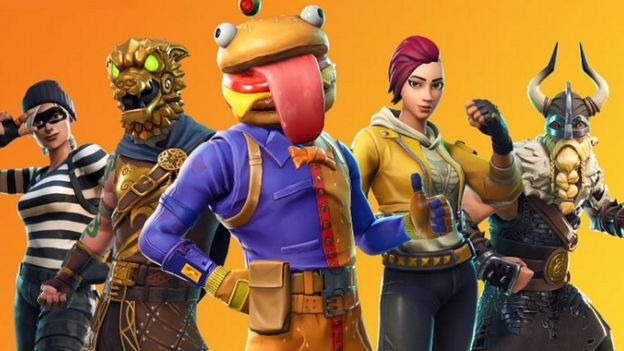 EPIC GAMES
EPIC GAMES
Offences like this fall under the Computer Misuse Act and carry a possible prison sentence of two years.
Some hackers show no signs of remorse or concern. One of the most prolific is a 17-year-old from Slovenia, who sells through his own website.
"You can't get caught, nobody checks it," he told the BBC from within the game.
Amidst the gunfire and wall-building, he said he had made £16,000 in the seven months that he had been cracking.
He said his mother was an accountant who was helping him save for a first car. He sent screenshots of his Paypal accounts and Bitcoin wallets to confirm his business was real.
Another hacker showed proof of earnings ranging from £50 a day to almost £300.
The 15-year-old from France said his best week netted him £2,300.
"Yes I have done other stuff but nothing too big," he added, referring to identity fraud among other cyber-crimes.
- Fortnite players warned over hack attacks
- Rehab camp aims to put young cyber-crooks on right track
- The hidden history of cyber-crime forums
The National Crime Agency says there is a long-standing link between video games and hacking, and that publishers need to do more to prevent players being tempted into crime.
"What we want to see these companies do is not look at this from a purely technical standpoint," said the agency's lead on gaming, Ethan Thomas.
"What we'd like... is the gaming industry engaging more with law enforcement and looking at early intervention messaging on their platforms to divert [youngsters] on to a more ethical and legal path."
Debbie Tunstall runs rehabilitation days for low-level hackers who have been caught.
She is concerned about networks like Fortnite's cracking community.
"We know that these sorts of activities are linked to organised crime and we know that they are being egged on by more dangerous people behind the scenes," she explained.
"There is definitely cyber-crime grooming taking place and if we don't act they could easily get taken down that route."
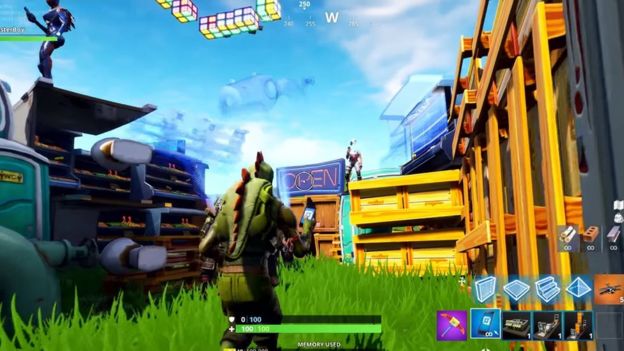 EPIC GAMES
EPIC GAMES
The issue of account hacking on Fortnite was first brought to the attention of Epic in March, when it said it was looking into the problem.
Hackers say it makes it extremely hard for them to access an account if players add two-factor authentication to their own accounts.
Epic encourages the security measure by rewarding those who adopt it with in-game accessories but has opted not to make the step mandatory.